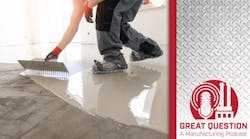Podcast: Navigating the Flooring Needs of EV Battery Manufacturing Plants
In the latest episode of our podcast, Vikki Young, the global research and development group leader for Sherwin-Williams high-performance floor coatings, dives into the unique flooring challenges faced by electric vehicle (EV) battery production facilities. Vikki spoke with Tom Wilk, editor-in-chief of Plant Services, sharing insights on how these high-tech environments require specialized flooring systems to manage harsh chemicals, prevent slip hazards, and control electrostatic discharge.
Below is an excerpt from the podcast:
PS: I love the fact we're going to talk about EV battery production facilities today because (1) they’re a high-growth area and (2) they’re specialty buildings. What can you tell us about the ways that these facilities are different from other large manufacturing environments, like pulp and paper or petroleum?
VY: Many of the electrical vehicle battery plants today are newly built facilities, so we have owners that are concerned about protecting their floors during construction, but also during the production process when they are up and running. Another consideration is that these facilities use a variety of really harsh chemicals during the production process. For example, there's n-methylpyrrolidone (NMP), and it's used to create these battery-type mixtures with carbon black and graphite. These mixtures can potentially spill onto the floor during production, and they can create a potential slip hazard for workers.
In addition to that, these types of facilities have clean and dry rooms within the facility, and there needs to be considerations for moisture control and electrostatic discharge control as well because there are sensitive electronic parts being produced in those areas.
PS: In our previous communication you had separated out the difference between flooring and coatings, and those are two different parts of the same product here. Your team pays special attention to both of those areas of the floor?
VY: Yes, in these electronic vehicle facilities, the main floor surface is concrete, it's just above ground. It needs to be protected, so floor coating systems are really important. They're tailored to meet the requirements for these EV battery facilities. The system builds, for example, are designed using conventional coatings, but they have unique requirements in each of the sections of the production layout.
As I mentioned before, clean and dry rooms require electrostatic control coatings, and also special coatings that can block and absorb moisture vapor that might be coming from the concrete. Moisture and static discharge control is really important, so we don't damage these sensitive electronic components.
There's also these areas where harsh chemicals are being used, and they require specialized systems that have proven performance to be resistant to chemical spills. At Sherwin-Williams we like to partner with these owners, the general contractors and the installers at these facilities to review the site conditions and really understand that production layout. What types of materials are being used during the manufacturing process is really important, and I can provide more examples on how we can tailor a system especially for these facilities.
PS: That's a great opportunity to talk about custom applications, whether there are standard high-performance flooring choices across plants or whether your team customizes the flooring system to each EV factory. Could you give us a couple of examples of the way that your team has gone onto a site and taken a look, and assessed the environmental conditions or the geographic location and decided about on a specific flooring option?
VY: Sure. So as I mentioned before, in these facilities, they're using solvents like NMP in their cathode slurries. There also is NMP in the cathode binder resins -- it helps to break them down in during the battery process, so it's really a concern that these chemicals don't get into the concrete or into the environment below the concrete.
Also, workers have to be protected. During the production process when they're using these materials, they’re could potentially be spills, so we have to make sure that we have the right floor coating that is resistant and won't soften and blister if the chemicals are on the flooring surface.
Sherwin will partner with the owner to perform different types of chemical resistance testing. We can do this either in the laboratory setting or we can do this on-site with the actual slurry mixtures and binder formulas that are being used in these EV battery facilities. We have found that many of the owners prefer on-site testing because they do want to protect the sensitive formulas that they're using, and it also gives us a real world type setting to run that testing.
About the Podcast
Great Question: A Manufacturing Podcast offers news and information for the people who make, store, and move things and those who manage and maintain the facilities where that work gets done. Manufacturers from chemical producers to automakers to machine shops can listen for critical insights into the technologies, economic conditions, and best practices that can influence how to best run facilities to reach operational excellence.
Listen to another episode and subscribe on your favorite podcast app
About the Author
Tom Wilk
Editor in Chief, Plant Services – Endeavor Business Media
Tom Wilk is the Editor in Chief of Plant Services, an Endeavor Business Media partner site.
Previously, Tom was a Technical Writer and a Social Media Manager for Panduit as well as a Senior Technical Editor for Battelle Memorial Institute.
